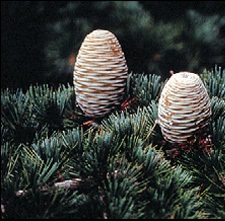
Devadaru is a large evergreen coniferous tree that thrives in the high altitude of the western Himalayas. It means ‘wood of the gods’. It is a good cure for diarrhea and neuralgic pain.
Benefits of Devadaru: Inflammation, antispasmodic, anti-poison, fevers, external injuries, paralysis, kidney stones, diarrhea, skin diseases, dysentery, indigestion, lung diseases.
Action: Leaves—mild turpentine properties, Wood—carminative; bark—astringent, febrifuge.
Scientific name: Cedrus deodara.
Useful parts: Leaves, bark.
Dosage: 0.5–5g or 1–10ml per day.
Energetics
Rasa(taste): Bitter, pungent
Vırya(energy): Heating
Vipaka (post-digestive effect): Pungent
Guna (quality): Light, unctuous
Dosa effect: VK−, P+
Dhatu(tissue): Plasma, blood,muscle, fat
Srotas (channel): Digestive, respiratory, circulatory
Classical and common names
Ayurvedic: Devadaaru, Suradruma,Suradaaru, Devakaashtha, Devadruma, Saptapatrika, Daaru, Bhadradaaru, Amarataru, Amaradaaru, Daaruka, Devaahvaa, Surataru, Surabhuruha.
English: Himalayan Cedar, Deodar.